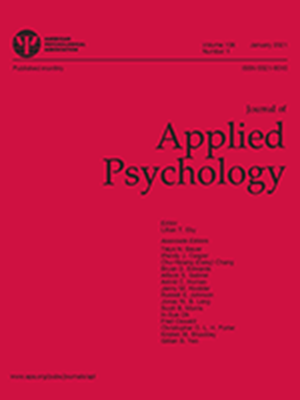Group differences in biographical inventories: A meta-analysis on the adverse impact potential of biodata.
IF 6.1
1区 心理学
Q1 MANAGEMENT
引用次数: 0
Abstract
The purpose of the present meta-analysis was to determine if biodata scale scores differ based on demographic group membership (i.e., gender, race, age) and to evaluate the contextual factors that amplify or mitigate these effects (e.g., construct domain, scoring method). Despite the popularity of biodata scales for personnel selection purposes, previous research findings do not provide clear evidence as to whether adverse impact is a serious concern. To address this gap, a meta-analysis of 43 studies (56 independent samples) was conducted, providing estimates of group differences across demographic groups (female-male, Black-White, Hispanic-White, Asian-White, and age) and relevant construct domains. The majority of biodata scale scores were found to exhibit small group differences across construct domains and demographic groups (≈75% had Cohen's d less than |.20|). Group differences were also relatively small when compared with other popular selection methods. When considered with previous research, these findings provide further support for the use of biodata scales in personnel selection scenarios. (PsycInfo Database Record (c) 2025 APA, all rights reserved).生物资料组间差异:生物资料潜在不利影响的荟萃分析。
本荟萃分析的目的是确定生物数据量表评分是否根据人口统计学群体成员(即性别、种族、年龄)而有所不同,并评估放大或减轻这些影响的背景因素(例如,构建域、评分方法)。尽管生物数据量表在人员选择方面很受欢迎,但以前的研究结果并没有提供明确的证据来证明不利影响是否值得严重关注。为了解决这一差距,对43项研究(56个独立样本)进行了荟合分析,提供了人口统计学群体(女性-男性、黑人-白人、西班牙裔-白人、亚裔-白人和年龄)和相关结构域的群体差异估计。发现大多数生物数据量表得分在结构域和人口统计学组之间表现出较小的组差异(约75%的Cohen's d小于0.20 |)。与其他流行的选择方法相比,群体差异也相对较小。考虑到以前的研究,这些发现为在人员选择方案中使用生物数据量表提供了进一步的支持。(PsycInfo Database Record (c) 2025 APA,版权所有)。
本文章由计算机程序翻译,如有差异,请以英文原文为准。
求助全文
约1分钟内获得全文
求助全文
来源期刊

Journal of Applied Psychology
Multiple-
CiteScore
17.60
自引率
6.10%
发文量
175
期刊介绍:
The Journal of Applied Psychology® focuses on publishing original investigations that contribute new knowledge and understanding to fields of applied psychology (excluding clinical and applied experimental or human factors, which are better suited for other APA journals). The journal primarily considers empirical and theoretical investigations that enhance understanding of cognitive, motivational, affective, and behavioral psychological phenomena in work and organizational settings. These phenomena can occur at individual, group, organizational, or cultural levels, and in various work settings such as business, education, training, health, service, government, or military institutions. The journal welcomes submissions from both public and private sector organizations, for-profit or nonprofit. It publishes several types of articles, including:
1.Rigorously conducted empirical investigations that expand conceptual understanding (original investigations or meta-analyses).
2.Theory development articles and integrative conceptual reviews that synthesize literature and generate new theories on psychological phenomena to stimulate novel research.
3.Rigorously conducted qualitative research on phenomena that are challenging to capture with quantitative methods or require inductive theory building.
 求助内容:
求助内容: 应助结果提醒方式:
应助结果提醒方式:


